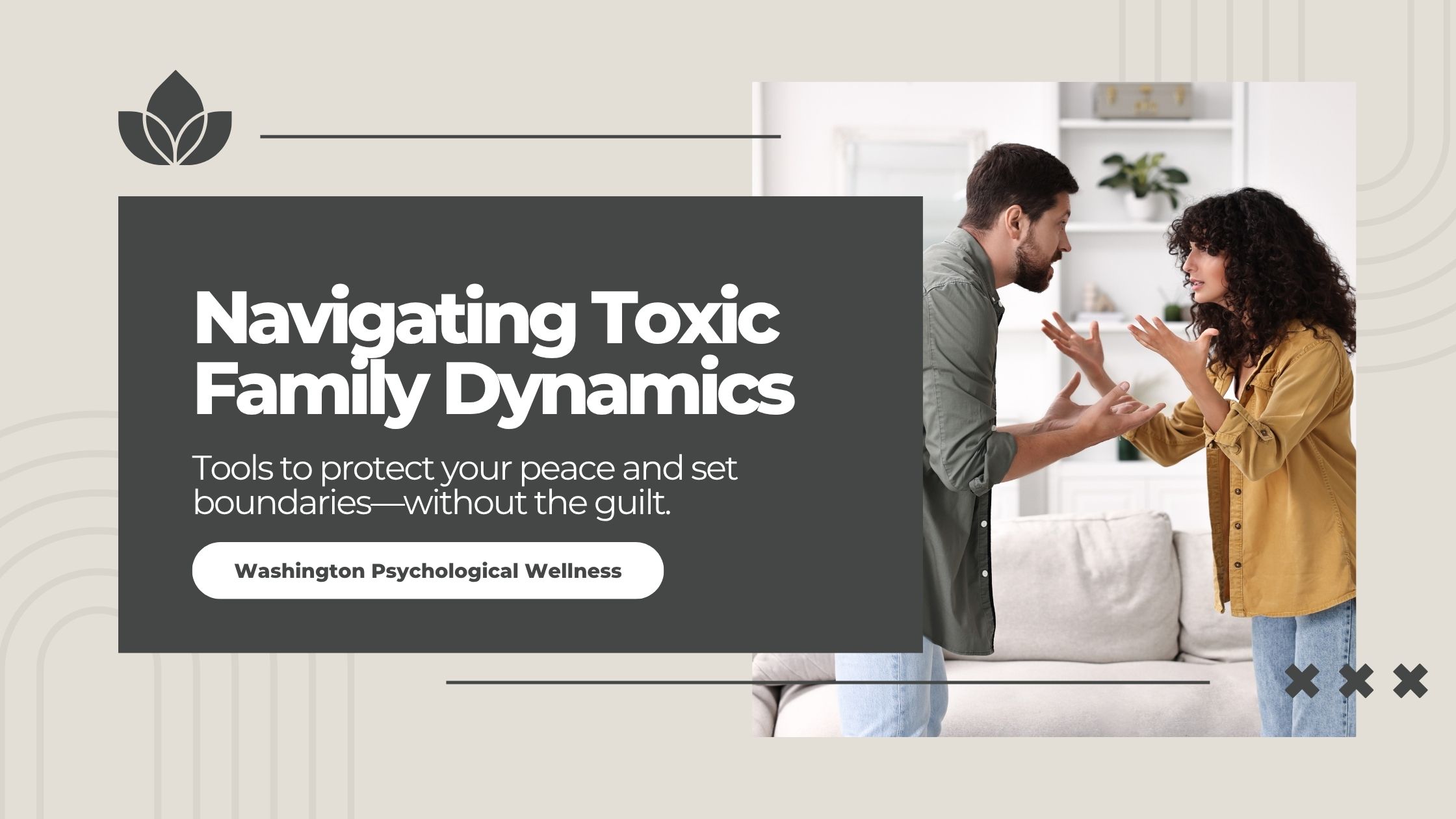
How to Deal with Toxic Family Members
By Washington Psychological Wellness |Therapy & Coaching in Montgomery County, with offices in Rockville, and Gaithersburg, MD
Family can be a wonderful source of love, support, and connection. But for many people, family is also a source of stress, manipulation, and emotional pain. Whether it’s a critical parent, a guilt-tripping sibling, or a relative who constantly crosses boundaries, toxic family dynamics can have a serious impact on your mental and emotional well-being.
If you find yourself dreading family gatherings, feeling triggered by a text message, or walking on eggshells during conversations, you’re not alone. The good news? You can protect your peace while maintaining your values and self-respect.
Here’s how to deal with toxic family members—without losing yourself in the process.
Our Guide to Dealing with Toxic Family Members
1. Name the Behavior—Not Just the Person
Calling someone “toxic” can be helpful shorthand, but what really matters is identifying how their behavior is affecting you. Are they controlling? Passive-aggressive? Emotionally dismissive? Do they gaslight you, guilt-trip you, or constantly push your buttons?
Naming the specific behavior helps you get clear on what’s happening—and allows you to set boundaries around it. It shifts the focus from blaming to understanding, which is crucial for protecting your mental health.
2. Set Boundaries Like Your Peace Depends on It (Because It Does)
Boundaries are not about punishment—they’re about self-preservation. You have every right to say:
- “I’m not available for this conversation.”
- “Let’s change the subject.”
- “I need space, and I hope you’ll respect that.”
You don’t need your family member’s permission to set a boundary. Your well-being matters, and enforcing healthy limits can create the distance you need to breathe again.
3. Stop Trying to Win
You may never get a toxic family member to admit they’re wrong or see things from your perspective. Let that be okay. Your goal isn’t to win the argument—it’s to maintain your mental health. Trying to change someone who’s deeply stuck in their patterns will only drain your energy. Instead, focus on how you show up, how you respond, and how you choose to heal.
4. Limit Contact if Needed (Without the Guilt)
It’s okay to step back. You’re allowed to say no to the phone call, skip the family gathering, or take a break from the relationship altogether. Loving someone doesn’t mean tolerating mistreatment.
If guilt creeps in, ask yourself: Would I accept this behavior from a friend? If the answer is no, you have your answer. Sometimes protecting your peace means redefining what family means to you.
5. Focus on Your Own Healing
Toxic family relationships often trigger old wounds. Therapy can help you recognize those wounds, reclaim your voice, and learn new ways to respond. At Washington Psychological Wellness, we support clients in:
- Setting boundaries that stick
- Breaking free from unhealthy family roles
- Working through guilt and shame
- Rebuilding self-esteem and emotional resilience
You don’t have to carry the weight of dysfunction alone. Healing is possible—and it starts with you.
Need Support with Difficult Family Relationships?
At Washington Psychological Wellness, we specialize in helping individuals navigate toxic family dynamics with clarity and confidence. Our compassionate therapists and coaches in Gaithersburg and Rockville, MD are here to help you reclaim your peace, set healthy boundaries, and move forward with self-respect.
Book a free 15-minute consultation today and take the first step toward healing. You deserve to feel safe, seen, and supported—no matter what your family looks like.
